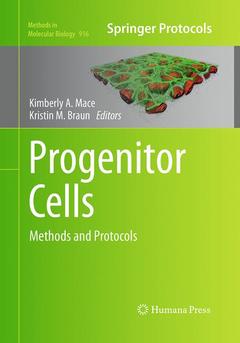Description
Progenitor Cells, Softcover reprint of the original 1st ed. 2012
Methods and Protocols
Methods in Molecular Biology Series, Vol. 916
Language: English
Subjects for Progenitor Cells:
Support: Print on demand
408 p. · 17.8x25.4 cm · Hardback
Description
/li>Contents
/li>Comment
/li>
Progenitor cells have become important in regenerative medicine therapies, due to their potential to differentiate into many cell types. This capability, and understanding how to regulate the cells, will provide the basis for future cell therapies aimed at correcting tissue and organ dysfunction as a result of disease or injury. In, Progenitor Cells: Methods and Protocols, expert researchers in the field detail many of the methods which are now commonly used to investigate progenitor cells. These include methods and techniques of the manipulation of physical forces that shape progenitor cell behavior, studying progenitor cells in vivo, using non-mammalian and mammalian model systems, and investigating human progenitor cells, including their isolation, characterization and application in cell-based therapies. Written in the highly successful Methods in Molecular Biology? series format, chapters include introductions to their respective topics, lists of the necessary materials and reagents, step-by-step, readily reproducible laboratory protocols, and key tips on troubleshooting and avoiding known pitfalls.
Authoritative and practical, Progenitor Cells : Methods and Protocols seeks to aid scientists in the further study progenitor cells and how they are studied across multiple systems.
Isolation of Satellite Cells from Single Muscle Fibres from Young, Aged or Dystrophic Muscles.-Terminal Differentiation of Human Epidermal Stem Cells on Micro-patterned Substrates.-Isolation, Culture and Potentiality Assessment of Lung Alveolar Stem Cells.-Three-dimensional In Vitro Culture Techniques for Mesenchymal Stem Cells.-Isolation of Adult Stem cells and their Differentiation to Schwann Cells.-Functional Purification of Human and Mouse Mammary Stem Cells.-Isolation and Expansion of Endothelial Progenitor Cells Derived from Mouse Embryonic Stem Cells.-Transcriptome Analysis of Drosophila Neural Stem Cells.-Live Imaging for Studying Asymmetric Cell Division in the C. elegans Embryo.-Tol2-mediated Gene Transfer and in ovo Electroporation of the Otic Placode: A Powerful and Versatile Approach for Investigating Embryonic Development and Regeneration of the Chicken Inner Ear.-Labelling Primitive Myeloid Progenitor Cells in Xenopus.-Identification of Oocyte Progenitor Cells in the Zebrafish Ovary.-FACS Analysis of the Planarian Stem Cell Compartment as a Tool to Understand Regenerative Mechanisms.-Clonal and Lineage Analysis of Melanocyte Stem Cells (MSCs) and their Progeny in the Zebrafish.-Reconstitution of the Central Nervous System During Salamander Tail Regeneration from the Implanted Neurospheres.-Following the Fate of Neural Progenitors by Homotopic/homochronic Grafts in Xenopus Embryos.-Analysing the Angiogenic Potential of Gr-1+CD11b+ immature Myeloid Cells from Murine Wounds.-In vivo Imaging of Hematopoietic Stem Cells in the Bone Marrow Niche.-Characterising the Phenotype of Murine Epidermal Progenitor Cells: Complementary Wholemount Visualisation and Flow Cytometry Strategies.-Murine Aggregation Chimeras and Wholemount Imaging in Airway Stem Cell Biology.-Live Imaging of Primitive Endoderm Precursors in the Mouse Blastocyst.-Utilising DNA Mutations to Trace Epithelial Cell Lineages inHuman Tissues.-NF-Ya Protein Delivery As a Tool for Hematopoietic Progenitor Cell Expansion.-Exploring the Link Between Human Embryonic Stem Cell Organization and Fate using Tension-calibrated Extracellular Matrix Functionalized Polyacrylamide Gels.-Isolation of Circulating Angiogenic Cells.-Methods for Characterisation / Manipulation of Human Corneal Stem Cells and their Applications in Regenerative Medicine.-ALDH as a Marker for Enriching Tumorigenic Human Colonic Stem Cells.-Protocols for Investigating microRNA Functions in Human Neural Progenitor Cells.




